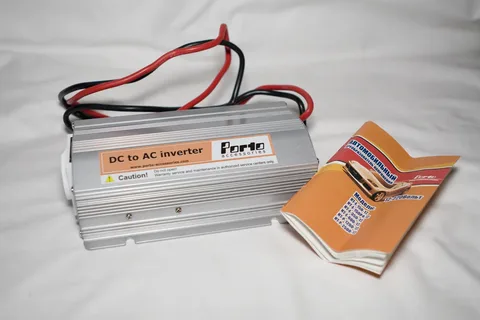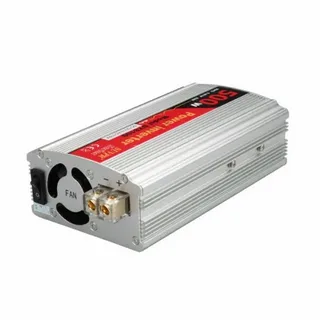DC inverters are revolutionizing energy efficiency in various applications, enabling us to maximize our resources and power up our lives with more sustainable options. But what is DC inverter exactly? How do it works? And why should we choose it over other solutions? In this blog post, we’ll explore the magic behind DC inverters, delving into the mysteries of their powerful potential to transform how we use energy. Read on to discover the answers to these questions and more.
Understanding Inverters and Their Role in Energy Efficiency
Inverters are electrical devices that convert DC (direct current) into AC (alternating current) or vice versa. Their primary function is to regulate and adjust the power supply according to the application’s specific needs.
Inverters play a critical role in energy efficiency. Traditional AC-powered systems, such as motors and lights, consume significant energy as they run at a constant speed. In contrast, inverters control the speed of the engine, compressor, or other device by regulating the frequency of the AC signal, allowing them to adjust their output based on demand.
This ability to regulate and optimize energy usage has revolutionized many industries, including solar power, electric vehicles, and HVAC systems. DC inverters, in particular, are gaining popularity due to their higher energy efficiency, compact size, and ability to integrate seamlessly with renewable energy sources.
Inverters have transformative potential, enabling organizations to reduce energy consumption, lower carbon footprint, and cut operational costs. As new technological advancements emerge, inverters are expected to become even more efficient, enabling a sustainable future.
DC To AC Inverter: What’s The Difference?
Regarding energy conversion, inverters are vital in converting DC (direct current) into AC (alternating current). While dc to ac inverter is designed for the same purpose, its mechanisms and applications differ significantly.
AC inverters are generally more commonly used and widely available in the market. They are known for their high-voltage capacity and can convert DC power into AC power, suitable for various home appliances, office equipment, and industrial machinery.
On the other hand, DC inverters are more specialized and designed to convert DC power into low voltage, typically less than 50 volts. They are ideal for low-power applications, such as charging batteries, running LED lights, or powering small electronic devices. DC inverters are also more energy-efficient, producing less heat and noise, which makes them ideal for applications that require silent and reliable performance.
Regarding energy efficiency, DC inverters are superior to AC inverters due to their ability to operate at variable speeds, optimizing power output based on demand. This saves energy and reduces the wear and tear on equipment, prolonging its lifespan.
Overall, while AC inverters remain popular and versatile, DC inverters offer a new level of energy efficiency, reliability, and performance. Their specialized applications make them a must-have in various industries, including automotive, aerospace, and renewable energy.
Advantages of DC Inverters in Various Applications
DC inverters offer numerous advantages in various applications. Here are some of the benefits:
Energy efficiency: DC inverters convert DC voltage into AC voltage with very high efficiency, making them ideal for applications that require a constant power supply while minimizing energy waste. They achieve this by controlling the speed of the compressor, motor, or other loads.
Noise reduction: DC inverters operate quietly as they do not rely on on-off cycles like traditional AC motors. This feature is particularly important in HVAC systems operating quietly without disturbing occupants.
Durability: DC inverters have fewer moving parts compared to traditional AC motors, making them less prone to wear and tear. As a result, they offer a longer lifespan, reduced maintenance costs and improved reliability.
Versatility: DC inverters can be used in various applications, such as air conditioning, refrigeration, and power generation. They are also used in renewable energy systems, such as solar panels and wind turbines, to convert DC voltage to AC voltage.
Reduced energy bills: By improving energy efficiency, DC inverters help to reduce energy bills, making them a cost-effective solution in the long term.
How Dc Inverters Revolutionize Energy Efficiency?
DC inverters have brought energy efficiency to various applications, from air conditioners and refrigerators to electric vehicles and solar panels. The traditional method of converting DC (direct current) to AC (alternating current) was by using an AC inverter, which would constantly switch the polarity of the voltage to mimic an AC wave. However, this conversion method led to energy loss, increased power consumption, and inefficient operation.
On the other hand, DC inverters convert DC to a smooth AC wave using high-frequency transistors that rapidly switch the voltage on and off. This process ensures that the electrical signal remains constant and does not waste energy in the form of heat or noise. DC inverters can adjust the voltage and frequency according to the load demand, allowing the device to operate efficiently.
DC inverters have revolutionized energy efficiency by reducing energy consumption, improving performance, and decreasing the overall cost of the product. In addition, DC inverters have also led to the development of smart energy management systems that monitor and optimize energy consumption, further enhancing the efficiency of the application.
 Examples of DC Inverter Applications: Solar Panels, Electric Vehicles, and HVAC Systems
Examples of DC Inverter Applications: Solar Panels, Electric Vehicles, and HVAC Systems
DC inverters are used in many applications, making them a versatile and valuable component of modern technology. One of the most common applications of DC inverters is in solar panels. Solar panels use DC power, but most household appliances run on AC power. A DC inverter allows solar panel-generated DC power to be converted into AC power that the appliances in the house can use.
Another application of DC inverters is in electric vehicles. Electric vehicles use DC power stored in batteries to power their motors. The DC inverter converts the DC power from the battery into AC power to drive the electric motor. The inverter also manages the energy flow to and from the battery, ensuring optimal battery performance and efficiency.
HVAC systems, particularly air conditioning units, also benefit from DC inverters. DC inverter air conditioning systems use a variable speed compressor, allowing the system to adjust the cooling output to match the current temperature needs of the room. This saves energy and improves comfort by providing consistent temperatures and reducing noise levels.
Future Developments in Inverter Technology
The technological advancements in inverter technology are far from over. As energy efficiency continues to gain traction in different applications, inverter technology will undoubtedly become even more advanced in the future.
One of the areas where researchers are focusing on is improving the efficiency of DC inverters. Engineers are looking at ways to minimize power loss by making the devices more compact, with a higher level of integration and more effective heat management techniques.
Another area of development is the use of intelligent control systems in DC inverters. With the advent of the Internet of Things (IoT) and artificial intelligence, there are boundless possibilities for smart systems to regulate power consumption and make decisions in real time, ultimately increasing efficiency and cost savings.
Lastly, there is significant potential for applying DC inverters in renewable energy systems. This includes exploring their use in grid-connected photovoltaic (PV) systems, wind turbines, and energy storage systems. The integration of DC inverters with renewable energy sources can significantly enhance the efficiency of energy generation and use.
FAQs
1. What is the lifespan of a DC inverter?
DC inverters have a long lifespan if they are properly maintained and operated. The lifespan can vary depending on the quality of the inverter, its operating conditions, and how often it is used. In general, a well-maintained inverter can last for several years.
2. Can DC inverters be used with any appliance or device?
Not all appliances and devices are compatible with DC inverters. It is important to check the power requirements of the appliance or device before using a DC inverter. Some appliances may require a higher voltage or current than what the inverter can provide.
3. How DC inverter saves energy?
DC inverters can save energy in several ways. First, they can convert DC power from a renewable energy source like solar panels into AC power for use in homes or businesses. This reduces the need for energy from traditional power grids. Second, DC inverters can regulate the power output of appliances and devices, which can reduce energy consumption. Finally, DC inverters can convert energy from an appliance or device back into DC power, which can be stored and used later, further reducing energy consumption.
Conclusion
In conclusion, DC inverters are transforming the way we approach energy efficiency across a variety of applications. By converting direct current (DC) to alternating current (AC) through the use of advanced electronics and sophisticated software, these innovative devices are playing an increasingly critical role in a range of cutting-edge technologies, including solar panels, electric vehicles, and HVAC systems. Whether you’re looking to reduce your carbon footprint, save money on energy bills, or power your business with next-generation technology, DC inverters represent an exciting new frontier in energy efficiency that is well worth exploring.
| Other Good Articles to Read |
| Blogs Rain |
| Cme Blog Spot |
| Garcias Blogs |
| Yyc Blogs |
| Guiade Blogs |
| Blogs-Hunt |
| Impact-Blog |
| Smarty Blogs |
| Ed Blog |
| Mo Blogs |
| Blogs T |
| Business Listings in Australia |



